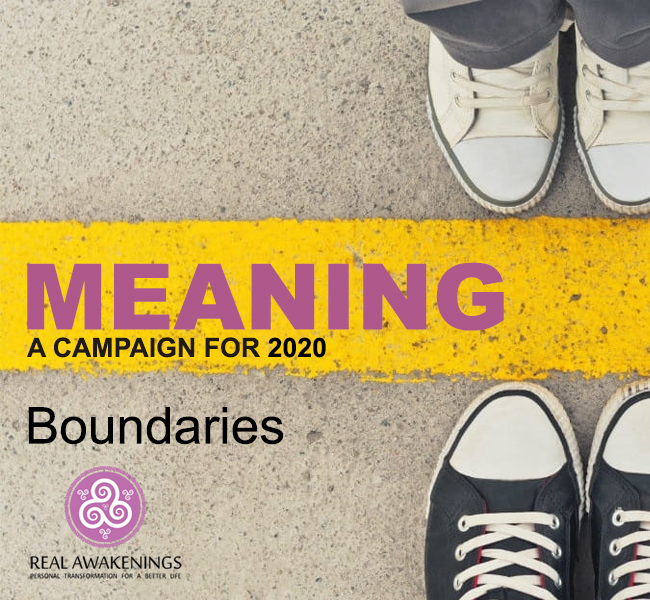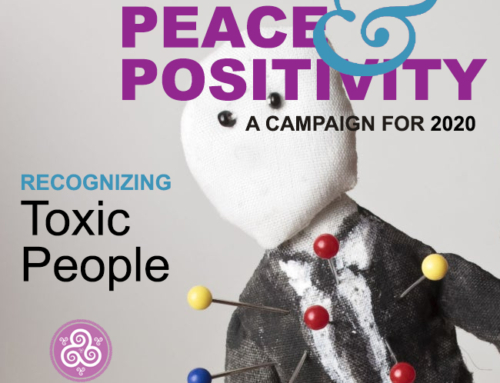Published Feb 6, 2020 by Bonnie Ontko, MA
Setting Boundaries
The Key to Healthy Relationships
Boundaries are markers of personal space, whether it’s property lines, or the invisible psychological demarcations of a relationship. They define the parameters of separateness and individuation between you and another person or object. Effective boundary setting is a critical part of healthy human development and interaction. Boundaries, or lack of them, set the ground rules and patterns of behavior that color all our interactions. In the animal world, boundaries are continuously tested and reestablished to maintain order within a pack or group. When executed properly, boundaries set limits and determine the degree of closeness you have with a person. When the line is crossed or violated, a relationship can be compromised and jettison in an entirely different direction.
Healthy people think nothing of establishing good boundaries. Boundaries establish respect, define what really matters or what will be tolerated, and help people avoid undesirable or potentially dangerous situations. Boundaries can also designate the space in which a relationship can function and flourish. In the end, having clear boundaries provides the framework for you to say no, stick to your guns, or defend yourself when appropriate.
Taking Stock of Your Boundaries
Self Inventory
- Are you taken advantage of by being a people pleaser and compromising, giving too much or being too be nice?
- Are you being routinely controlled by someone who is pushy, bossy, domineering or who directs your thoughts, actions or decisions?
- Is your every action or statement intensely scrutinized and monitored?
- Do you or someone you know have a tendency to reveal their entire life story to someone you’ve just met?
- Are you being physically attacked or threatened?
- Are you robbed of your identity from unnecessary competition?
Boundary Violation Indicators
- Toxic Group Think (see blog post) where a group, family, company or organization encourages or forces its members to follow a given set of rules or ideas that dictate people’s thoughts, beliefs and actions. Conformity can happen overtly, right out in the open, or on subtle covert levels. No deviation is allowed where people can demonstrate their uniqueness or independence for fear of being ostracized, criticized, or ousted from the group. You comply to belong and avoid the pain of rejection and isolation.
- Deny or Minimize: This involves situations where you feel a physical and/or emotional space being violated, yet you tell yourself a story like, “Oh, it doesn’t really matter,” or “I’ll just blow if off and it will go away.” Denying reality disconnects you from your feelings, and effects your ability to recall what exactly happened.
- Playing the Victim or Martyr Role: This happens when your boundary is violated, and you feel totally victimized, and become overly defensive to avoid another attack. Or, you may knowingly allow more violations, only to play the martyr role down the road. It’s like having victim bragging rights to show what you’ve tolerated, and to gain sympathy. You may also harbor a grudge, or have an axe to grind, actually daring someone to invade your space again.
- Retreat or Become Invisible: As a coping mechanism, you may find yourself retreating when a boundary is violated, or you’re ignored or rejected. Others never know what you’re really feeling or thinking. Invisibility is a defensive posture, where a person actually gets others, before others can get them—a power play of sorts. Walls or barriers are erected to safely avoid further invasion of their emotional or physical space.
- Lack of Privacy or Feeling Smothered: This is when a person becomes too intrusive of another’s personal needs, interests, or emotional and physical space. It can become so overpowering that a person feels suffocated, violated, used and overwhelmed. You begin to feel as though nothing you think, feel or do is really your business anymore. You’re expected to provide a detailed account of your feelings, reactions, opinions, and experiences to your family, spouse, or circle of friends. Nothing is private, and there’s no space to be your own person.
- Competitiveness: Toxic competitiveness is where admiration turns into a sick form of identity theft. They say imitation is form of flattery, but when it robs you of your individuality, and every nuance of your identity or work is copied and/or competed against, you become suffocated, exhausted, and widdled down to a bloody stump.
Setting Boundaries
You’ve taken stock of your relationships, assessed your boundaries, and things suddenly become crystal clear. Try and examine your reasons for not setting or maintaining a strong enough boundary from the start. Where did things go wrong? Without a clear definition of where you begin and end, and another person begins and ends, the relationship becomes blurred, enmeshed and codependent. Both parties have no distinct identity, independence or individuality. Toxic boundary pushers go hand in glove with empaths—they’re destined to have issues.
Now you’re ready to set a boundary. Mature healthy people automatically respect boundaries, so if one is crossed by mistake, it can easily be restored. But, most likely there’s a degree of dysfunction or toxicity involved in the relationship, so take caution. Be direct and take a firm stance. Don’t get caught debating, defending or over-explaining your position. Don’t be afraid to enforce a boundary or let people know the consequences.
One of the most important aspects of setting boundaries is to have realistic expectations. If you have a pattern of not establishing boundaries, and begin to change your pattern to set even the tiniest boundary, be prepared. You broke protocol, and will be met with instant overreaction, personalization, victimhood, tears, a fight, or reckless impulsive behavior. The person who finally pushed your buttons for the last time is exposed, and losing control, status and power. An enraged vengeful monster is now unleashed who will immediately reject any responsibility for your declaration of boundaries. The jig is up as you’ve called them out. They’ll run to their peers, roust their flying monkeys, and develop a smear campaign to ruin your reputation and destroy you. Being put in their place is absolutely too much to handle, so anything you say or do will be twisted around, so they are the ones setting the boundary, delivering the pain, and maintaining the upper hand. They will by no means be upstaged or dethroned.
Reclaiming your personal power and independence in an unhealthy relationship is the first step to regain freedom, redefine parameters, or start over. Be prepared to stand on your own, go grey rock, and be very unpopular. It’s a critical juncture where if there is physical or sexual abuse involved, establishing a new boundary could spawn vicious attacks. This happens frequently during a divorce or breakup, so you may need backup, or seek the advice of a professional.
Please feel free to leave your comments or questions below.


